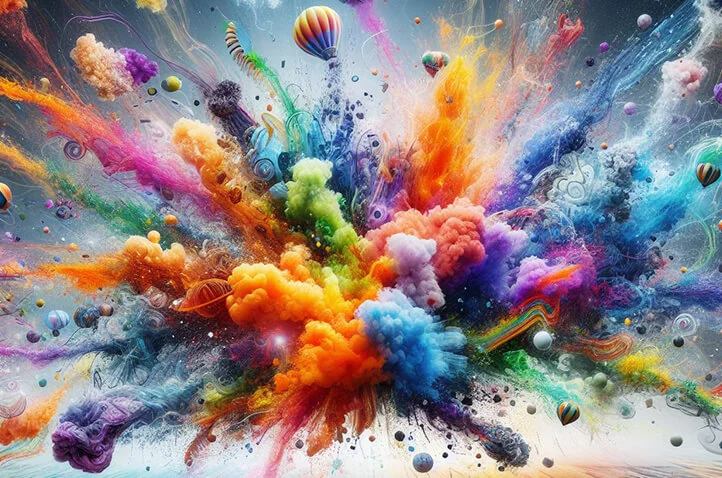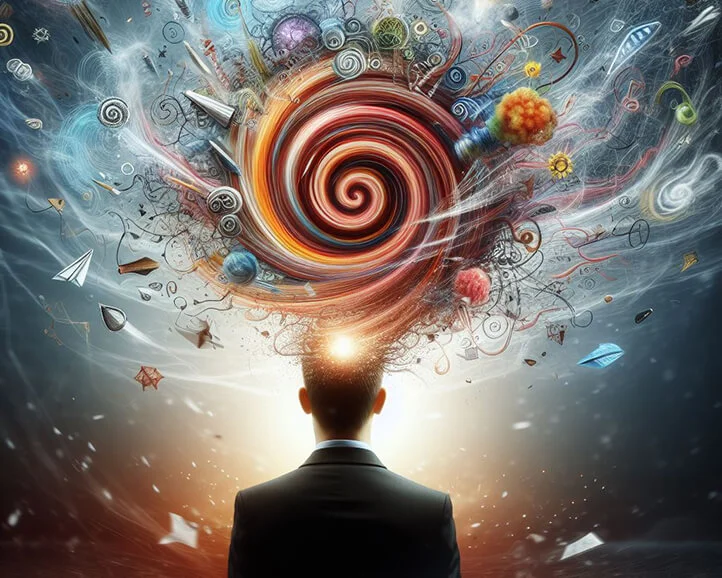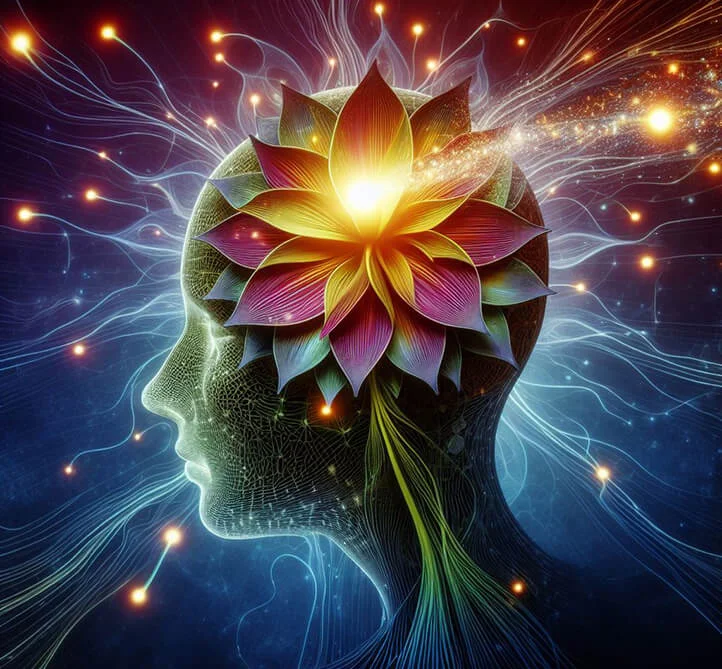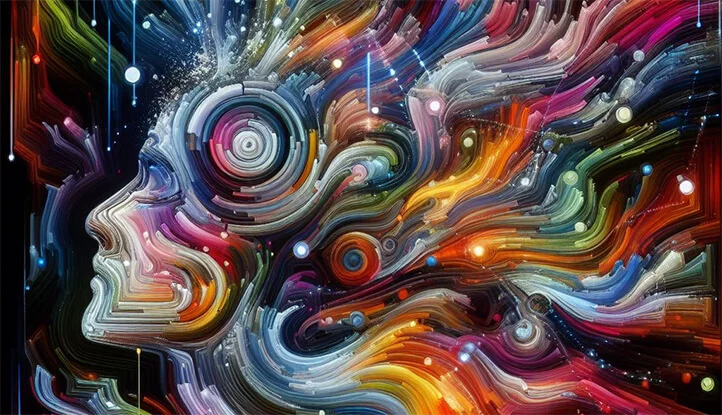Hypomania is a state of moderately elevated mood, energy, and activity that is part of the bipolar disorder spectrum. While hypomania may be perceived as a positive and productive state, it represents a form of manic episode and can lead to serious consequences if left untreated.

Symptoms and Signs of Hypomania
Hypomania is characterized by a number of distinct symptoms and signs that differ from normal elevated mood by their intensity, duration, and degree of disruption in functioning. Here are the main ones:
- Elevated mood and energy. A person in a hypomanic state experiences euphoria, a heightened mood, and an increase in energy. This can manifest as excessive activity, talkativeness, impatience, and irritability. The elevated mood is often accompanied by feelings of emotional uplift, optimism, and self-confidence.
- Reduced need for sleep. People with hypomania require significantly less sleep than usual. They may feel alert and energetic after 4-5 hours of sleep or even less. This can lead to sleep disturbances and long-term accumulation of fatigue.
- Increased talkativeness. Hypomania is often accompanied by increased talkativeness, a tendency to interrupt others, and difficulties in maintaining conversations. A person may rapidly switch from one topic to another, become easily distracted, or speak too fast and incoherently.
- Distractibility. The heightened mental activity and accelerated flow of thoughts often lead to distractibility, difficulty concentrating, forgetfulness, and an inability to focus on one task or activity.
- Increased goal-directed activity. People in a hypomanic state frequently show increased activity in various areas of life, such as work, studies, hobbies, social interactions, or sexual activity. They may take on multiple tasks simultaneously and feel more productive than usual.
- Inflated self-esteem and overconfidence. Hypomania can be accompanied by excessive self-confidence, grandiose ideas, inflated ambitions, and unrealistic plans. A person may feel special, talented, or endowed with exceptional abilities.
- Impulsivity and risky behavior. In a state of hypomania, people sometimes demonstrate impulsive and risky behavior, such as uncontrolled spending, engaging in dangerous activities, excessive alcohol or drug use, promiscuous sexual behavior, etc.
It is important to note that not all symptoms necessarily appear simultaneously, and their severity can range from mild to moderate. Additionally, some of these symptoms alone do not necessarily indicate the presence of hypomania, as they may also occur in other conditions. A comprehensive evaluation by a specialist is required for diagnosis.

Causes of Hypomania
The causes of hypomania are complex and multifaceted, as this condition is linked to the complex interplay of biological, psychological, and social factors. Understanding the main causes and triggers of hypomania is crucial for developing effective prevention, treatment, and symptom management strategies.
Like bipolar disorder, hypomania has a multifactorial nature of onset. Genetic predisposition, neurochemical imbalances, psychological traumas, and stressful life events are key factors contributing to the development of this condition. Additionally, certain environmental and social aspects can also act as triggers for hypomanic episodes.
Biological Factors
Biological factors play an important role in the development of hypomania and other manifestations of bipolar disorder. Genetic predisposition, neurochemical imbalances in the brain, and changes in the functioning of certain neurotransmitter systems are considered key biological causes of this condition.
- Genetics. Modern research indicates that hypomania has a strong genetic component. It is believed that family members of individuals with bipolar disorder have a higher risk of developing similar mood disorders, including hypomanic episodes.
- Neurotransmitters. Imbalances in neurotransmitters such as norepinephrine, serotonin, and dopamine play an important role in the development of hypomania. These chemicals regulate mood, emotions, motivation, and cognitive functions, so their imbalance can contribute to the development of symptoms.
- Hormonal changes. Changes in hormone levels, especially during the postpartum period, menopause, or andropause, can trigger the development of hypomania in predisposed individuals.
Psychological Factors
In addition to biological causes, psychological factors also play a significant role in the development of hypomania. Stress, traumatic experiences, negative life events, and certain personality traits can increase a person’s vulnerability to this disorder.
- Stress. Prolonged or intense stress related to work, family issues, traumatic events, or other life circumstances can act as a trigger for a hypomanic episode.
- Psychological trauma, such as emotional, physical, or sexual abuse, as well as the loss of a loved one, can contribute to the development of hypomania, especially in individuals with vulnerable psyches.
- Negative life events. Significant negative changes in life, such as divorce, job loss, or financial difficulties, can also increase the risk of hypomania.
Social and Environmental Factors
In addition to biological and psychological causes, there are several social and environmental factors that can contribute to the development of hypomania or provoke its exacerbation. These factors are related to a person’s lifestyle, environment, and exposure to various external stimuli.
- Sleep disturbances. Lack of sleep, insomnia, or circadian rhythm disruptions can become a catalyst for the development of hypomania, especially in individuals with bipolar disorder.
- Seasonal changes. For some people, hypomania may occur more frequently at certain times of the year, such as spring or summer, due to changes in light exposure, temperature, and other environmental factors.
- Substance abuse. The use of certain stimulant drugs, such as cocaine, amphetamines, or hallucinogens, as well as excessive alcohol consumption, can trigger hypomanic symptoms or exacerbate an existing condition.
- Social isolation. A lack of social connections, loneliness, and the absence of support from others can increase the risk of developing hypomania, especially in individuals with bipolar disorder.
As a rule, hypomania develops as a result of the combination of several factors rather than a single specific cause. Understanding potential triggers and managing them can help in its prevention and treatment.

Diagnosis of hypomania
The diagnosis of hypomania is based on the criteria outlined in the Diagnostic and Statistical Manual of Mental Disorders (DSM-5). To establish the diagnosis, the following criteria are required:
- A period of elevated, expansive, or irritable mood lasting for at least 4 consecutive days.
- During this period, at least three of the following symptoms (or four if the mood is only irritable) must be present:
- inflated self-esteem or grandiosity;
- decreased need for sleep;
- more talkative than usual;
- flight of ideas or subjective experience of racing thoughts;
- distractibility;
- increase in goal-directed activity (social, work, academic, or sexual);
- excessive involvement in activities that have a high potential for negative consequences (e.g., unrestrained spending sprees, sexual indiscretions).
- Changes in mood and behavior must be noticeable to others.
- The impairment in functioning does not reach the level required for a diagnosis of “mania.”
- The symptoms cannot be explained by the physiological effects of substances (e.g., drugs, medications) or another medical condition.
- The symptoms cause clinically significant distress or impairment in important areas of life.
The difference between hypomania and mania
Although hypomania and mania share some common features, there is an important distinction in the severity and impact on a person’s functioning.
Mania is a more severe form of a manic episode where symptoms are significantly more intense. It is characterized by extremely elevated, euphoric, or irritable mood, grandiose ideas, exaggerated enthusiasm for activities, dramatically increased activity, and impulsiveness.
Behavior during mania can be dangerous or destructive, leading to risky actions, aggression, and psychotic symptoms such as delusions or hallucinations. The impairment in functioning during mania is so severe that hospitalization may be required.
In contrast, hypomania is considered a milder form of a manic episode, where the symptoms, although present, do not reach such a high degree of severity. A person in a hypomanic state is generally able to exert some control over their behavior and function socially, although some disruptions still occur.
Differential diagnosis
When diagnosing hypomania, it is important to conduct a differential diagnosis to rule out other possible causes of the symptoms. Some of the conditions that need to be distinguished from hypomania include:
- Bipolar I disorder (mania);
- Substance abuse;
- Medical conditions (hyperthyroidism, neurological disorders, infections);
- Other mental disorders (anxiety disorders, ADHD, personality disorders);
- Physiological reactions to medications;
- Normal periods of elevated mood and energy.
To make an accurate diagnosis, the following may be required:
- a thorough history-taking and symptom description;
- psychiatric evaluation;
- laboratory and instrumental tests to rule out organic causes;
- the use of standardized diagnostic tools and questionnaires.
Early and accurate diagnosis is crucial for timely treatment and preventing complications.

Treatment of hypomania
The approach to treating hypomania is usually comprehensive, involving several components: medication, psychotherapy, and lifestyle changes. The goal of treatment is not only to reduce current symptoms but also to prevent recurrences and transitions to more severe states, such as mania or clinical depression.
Pharmacotherapy
Medication plays a key role in the treatment of hypomania. Several classes of drugs are used to stabilize mood and control symptoms.
Mood stabilizers
Mood stabilizers help regulate mood swings and prevent manic and depressive episodes. The most commonly used are:
- Lithium. One of the oldest and most studied mood stabilizers used to treat bipolar disorder.
- Valproates. Drugs like valproic acid and its derivatives are also widely used for mood stabilization.
- Lamotrigine. This anticonvulsant is often prescribed as a mood stabilizer for bipolar disorder, including hypomania.
- Carbamazepine and oxcarbazepine. These anticonvulsants can also be used as mood stabilizers, especially in combination with other drugs.
Atypical antipsychotics
In some cases, especially with pronounced agitation or psychotic symptoms, atypical antipsychotics may be prescribed, such as:
- olanzapine;
- risperidone;
- quetiapine;
- aripiprazole.
These drugs help control hypomanic symptoms and prevent progression to mania. However, they carry risks of certain side effects, such as weight gain, drowsiness, and metabolic disturbances.
Antidepressants
Antidepressants are generally not recommended for monotherapy of hypomania, as they can trigger phase shifts and transitions to manic states. However, in some cases, they may be used in combination with mood stabilizers to treat depressive symptoms in bipolar disorder.
It is important to understand that pharmacotherapy for hypomania is a process that requires fine-tuning dosages and drug combinations. It should be conducted under strict supervision by a psychiatrist for maximum effectiveness and minimal side effects.
Psychotherapy
Psychotherapy is considered an integral part of treating hypomania, as it helps patients better understand their condition, manage it, and prevent relapses. The most common types of psychotherapy for hypomania include:
- Cognitive-behavioral therapy (CBT) is aimed at identifying and changing negative thought patterns and dysfunctional behaviors that may contribute to the development of hypomania or exacerbate its symptoms. It also helps patients learn techniques to regulate their emotional state and cope with stress.
- Family therapy. Involving the family and close circle in the treatment process is important. Family therapy helps family members better understand the nature of hypomania, develop strategies to support the patient, and create a favorable environment for their recovery.
- Psychoeducation. Psychoeducational programs provide patients and their families with information about bipolar disorder, hypomanic symptoms, treatment options, and self-help strategies. This increases awareness, helps recognize early signs of escalation, and improves understanding of treatment.
- Interpersonal and social rhythm therapy. This type of therapy focuses on stabilizing circadian rhythms and social rhythms (sleep, meals, physical activity), disturbances of which can trigger episodes of hypomania and other phases of bipolar disorder.
- Other options may be used depending on the patient’s individual needs, such as motivational interviewing, acceptance and commitment therapy (ACT), dialectical behavior therapy (DBT), or interpersonal therapy.
Psychotherapy is usually conducted individually or in groups, and its duration and intensity are determined by the severity of symptoms and response to treatment.
Lifestyle changes and self-help
In addition to medication and psychotherapy, lifestyle changes and self-help strategies aimed at stabilizing mood and improving overall well-being play an important role in managing hypomania.
- Adhering to a sleep schedule. Regular and sufficient sleep is crucial for people with bipolar disorder, as sleep disturbances can trigger hypomanic episodes. It is recommended to follow a consistent sleep schedule and avoid irregularities or oversleeping.
- Exercise. Regular moderate physical activity, such as walking, running, swimming, or yoga, helps reduce stress, improve mood, and increase overall energy levels. Exercise also helps normalize circadian rhythms and promotes endorphin release.
- Healthy diet. A balanced diet rich in nutrients such as omega-3 fatty acids, B vitamins, zinc, and magnesium has a positive impact on brain health, mood, and cognitive function. It’s also important to avoid excessive caffeine, sugar, and refined carbohydrates.
- Stress management. Stress management techniques, such as meditation before bed, progressive muscle relaxation, breathing exercises, or yoga, help reduce anxiety levels and prevent hypomanic flare-ups.
- Avoiding triggers. Understanding and avoiding factors that can trigger hypomanic episodes, such as lack of sleep, alcohol or drug use, stressful situations, or overexertion, is an important part of self-care for hypomania.
- Building a support system. Having a strong social network and receiving emotional support from loved ones, friends, or support groups can have a positive impact on recovery and help manage the challenges of bipolar disorder.
- Mood tracking. Regularly recording mood, energy, sleep, and other symptoms in a journal helps identify potential triggers and recognize early signs of hypomanic flare-ups.
Following these lifestyle and self-help recommendations not only helps manage hypomanic symptoms but also contributes to overall physical and mental well-being. Along with medication and psychotherapy, this forms a comprehensive approach to hypomania treatment.

Impact of Hypomania on Various Life Areas
While hypomania may be perceived as a relatively mild and even positive state of increased energy and activity, it is still a form of bipolar disorder and can significantly affect various aspects of a person’s life. Symptoms such as distractibility, impulsivity, inflated self-esteem, and sleep disturbances can create difficulties in professional, social, financial, and other areas, limiting normal functioning.
Increased activity, excessive multitasking, and the desire to take on multiple projects often interfere with completing tasks. Additionally, mood swings, irritability, and impulsiveness can lead to conflicts with others and worsen interpersonal relationships.
Professional and Academic Life
Symptoms of hypomania such as distractibility, impulsivity, and inflated self-esteem can negatively impact productivity and efficiency at work or in studies.
A person in a hypomanic state often has difficulty concentrating, completing complex tasks, meeting deadlines, and organizing their work. They may also be prone to making rash decisions or engaging in excessive multitasking.
Furthermore, hypomania is often accompanied by sleep disturbances, leading to fatigue, decreased cognitive abilities, and lower performance. This can result in reduced productivity, conflicts with colleagues or superiors, and even job loss or academic expulsion.
Interpersonal Relationships and Social Life
Increased talkativeness, impulsivity, irritability, and excessive energy, characteristic of hypomania, can create difficulties in interpersonal relationships and social life.
A person in a hypomanic state may become overly intrusive, interrupt others, ignore social norms and boundaries, and exhibit sudden mood swings. This can push people away and lead to conflicts and the breakdown of relationships.
Additionally, heightened sexual activity and impulsive behavior during hypomania may lead to reckless relationships or infidelity, negatively impacting romantic relationships.
Financial Situation
Impulsivity, inflated self-esteem, and unrealistic plans typical of hypomania can lead to serious financial difficulties and debt.
A person in a hypomanic state may engage in excessive spending, buying unnecessary things, making reckless investments, or pursuing risky business ventures. They may lose control over their finances, severely undermining their financial well-being.
Furthermore, impulsive behavior and risky actions during hypomania can lead to legal issues and fines, exacerbating financial burdens.
Physical Health
Hypomania can also negatively affect a person’s physical health for several reasons.
- Firstly, sleep and dietary disruptions, characteristic of this condition, can lead to overall exhaustion, weakened immunity, and an increased risk of developing chronic diseases such as cardiovascular disease, diabetes, or obesity.
- Secondly, increased psychomotor activity typical of hypomania can result in physical exhaustion and a higher risk of injury due to impulsive or unsafe actions.
- Thirdly, substance abuse, sometimes observed during hypomania, can significantly harm physical health in the long term.
Addiction and Risky Behavior
Hypomania is associated with an increased risk of developing addictions and engaging in risky behavior, which can sometimes lead to severe negative consequences.
Impulsivity, reduced critical thinking, and a heightened desire for new sensations typical of a hypomanic state may encourage a person to experiment with substances such as alcohol, drugs, or medications. This, in turn, can lead to addiction and further deterioration of mental and physical health.
Additionally, during hypomania, people are more prone to risky sexual behavior, dangerous driving, gambling, and other forms of potentially hazardous activities. This increases the risk of injuries, infections, legal issues, and legal troubles.
Thus, hypomania can significantly impact various life areas, including career, relationships, finances, and health. Timely treatment and symptom management are crucial for minimizing these negative consequences.

Possible Complications and Consequences of Hypomania
While hypomania is considered a milder form of a manic episode compared to mania, it can still lead to serious complications and long-term consequences if ignored or not treated properly. Below are some of the most common complications and consequences of hypomania:
Transition to Mania or Depression
One of the most dangerous complications of hypomania is the potential transition to full-blown mania or depression. Without treatment, hypomania symptoms can gradually worsen, reaching a critical level that may lead to mania.
Mania is characterized by extreme manifestations of elevated mood, energy, grandiose ideas, psychomotor agitation, and significant functional impairment. It may be accompanied by psychotic symptoms such as delusions or hallucinations and poses a serious danger to the individual.
On the other hand, hypomania often precedes a depressive episode as part of the cyclical nature of bipolar disorder. After a period of increased energy and activity, a person may fall into a deep depression with symptoms such as a depressed mood, anhedonia, sleep and appetite disturbances, guilt, and suicidal thoughts.
Timely treatment of hypomania with mood stabilizers and other methods can prevent the development of more severe phases of bipolar disorder.
Functional Impairment
Even if hypomania does not transition into mania, it can still disrupt a person’s normal functioning in various areas of life.
During hypomania, there may be problems at work or in school due to distractibility, impulsivity, and decreased productivity. In social and family relationships, difficulties arise from irritability, mood swings, and inattentiveness.
Moreover, hypomania can be accompanied by reckless spending and financial losses, harming a person’s financial well-being. In some cases, impulsive and risky behavior during hypomania can lead to legal problems and consequences.
Without proper treatment and symptom control, hypomania can cause significant disruption in normal daily activities and a person’s overall well-being.
Suicidal Risk
While hypomania itself is not directly associated with suicidal thoughts or attempts, it is part of bipolar disorder, which is linked to an increased risk of suicide.
Hypomania often precedes the development of depressive phases of bipolar disorder. Severe depression, in turn, is associated with suicidal thoughts, intentions, and suicide attempts.
Additionally, the psychosocial impairment that often occurs during hypomania (problems at work, finances, relationships) can increase the risk of depression and suicidal thoughts.
Timely diagnosis and effective treatment of hypomania aimed at stabilizing mood and preventing transitions to other phases of bipolar disorder are important factors in reducing suicidal risk.
Pregnancy and Postpartum Issues
For women with bipolar disorder, including hypomania, pregnancy and the postpartum period pose particular risks.
Hormonal changes during pregnancy and after childbirth can trigger an exacerbation of hypomania symptoms, often due to sudden fluctuations in estrogen and progesterone levels.
Moreover, sleep deprivation and significant stress, characteristic of the postpartum period, can also serve as triggers for the development of hypomania in predisposed women.
Hypomania during pregnancy or after childbirth can create significant difficulties in caring for the child, lead to relationship problems with a partner, and sometimes even endanger the safety of both the mother and the child.
Therefore, it is crucial for women with diagnosed bipolar disorder to carefully plan pregnancy and the postpartum period in collaboration with their healthcare provider.
Decreased Quality of Life
Overall, poorly controlled hypomania without appropriate treatment can significantly lower a person’s quality of life. Constant mood swings, cognitive impairments, impulsivity, and risky behavior interfere with normal functioning in everyday life.
Hypomania can lead to problems at work or school, conflicts with loved ones, financial difficulties, and even loss of social connections. It also negatively affects physical health and increases the risk of developing addictions.
All these factors together can severely undermine quality of life and well-being. The inability to control one’s emotions, behavior, and impulses often leads to feelings of helplessness and hopelessness.

Conclusion
Hypomania, often perceived as a positive and productive state, is actually a form of bipolar disorder that requires serious attention and treatment. Despite the relatively mild severity of symptoms, it can lead to various complications and long-term negative consequences if ignored.
It is important to remember that hypomania is not just a temporary “mood boost” but a symptom of a serious mental disorder.
While hypomania is considered a chronic condition, its symptoms can be effectively managed through a comprehensive approach that includes medication, psychotherapy, and lifestyle changes.
If you or your loved ones experience symptoms resembling hypomania, it is crucial to seek professional medical help. Do not be embarrassed or afraid—this is the first step toward improving quality of life. Timely diagnosis and comprehensive treatment under the supervision of qualified specialists will help manage hypomania symptoms and prevent serious complications. The key is to recognize the problem early and not ignore its manifestations.




